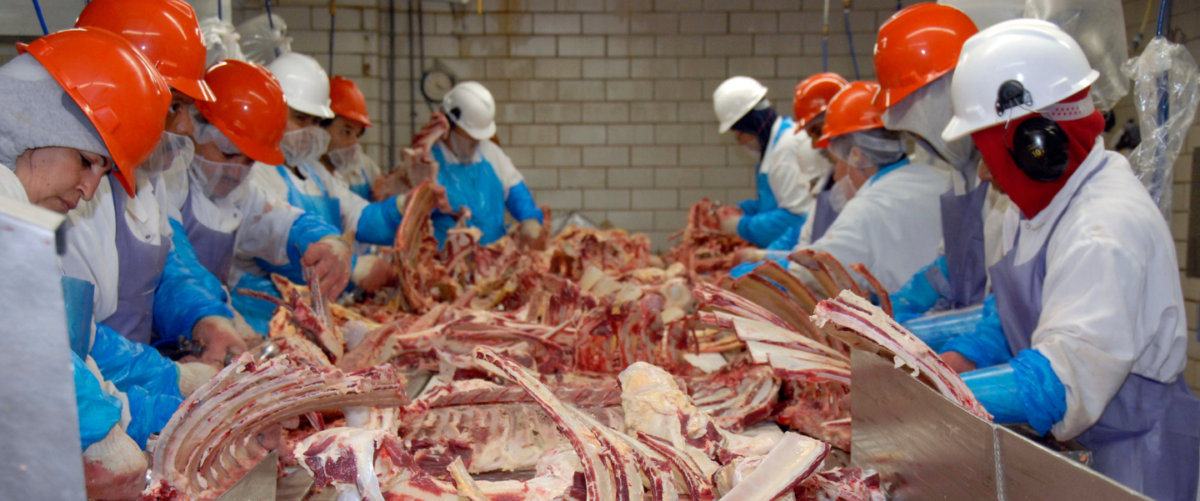On July 4, Let’s Celebrate The Ones Risking Their Lives To Keep Us Fed
Published Jul 1, 2020

We need food, but we also need our food workers to be safe. Let’s respect the workers who are feeding us and demand they be given safe working conditions amidst COVID-19.
July 4 is often celebrated by gatherings of family and friends who hold picnics and barbecues. Unless you are growing the food yourself, most of us rely on others to raise the crops and animals that are eventually processed into the food we consume.
Trump’s Declaration And A Lack Of COVID-19 Reporting Puts Food Workers At Risk
Because the Trump Administration declared food production as critical infrastructure during the COVID-19 pandemic, those in agriculture were required to work even as most of the rest of the country shut down. The people who process our food were made essential – just as first responders were – but they were denied the same level of protection. They were not provided personal protective equipment, like face masks and face shields; they couldn’t practice social distancing even though the Centers for Disease Control (CDC) and the Occupational Safety and Health Administration (OSHA) issued guidance recommending that workers stand six feet apart. To add insult to injury, USDA approved line speed waivers to 17 plants between March 26 and April 17, while COVID-19 infections were spreading in meatpacking and poultry processing facilities, so that production could be increased — putting these workers at further risk. Illnesses have also surfaced in cheese- and seafood-processing and fruit-packing facilities and among farmworkers on fruit and vegetable farms.
Because there are no requirements for the reporting of COVID-19 related illnesses and deaths, we have to rely on investigative reporting to assess the scope of the problem. According to the Food and Environment Reporting Network, as of June 22, 2020, there had been 32,000 COVID-19 cases and 109 deaths among food system workers. These numbers are probably understated because of the lack of reporting requirements and the reluctance of some workers to report illnesses for fear of employer retribution. Many workers in food production are immigrants and depend on these jobs to support themselves and their families.
Add your name to help food workers stay safe.
‘Meat Shortage’ Buzz Helped Smithfield And Tyson Profit, But Was It True?
In April, many meatpacking and poultry processing facilities began to close temporarily because hundreds of their workers became infected with COVID-19. The CEOs of both Smithfield and Tyson Foods issued dire warnings that there would be major food shortages because of the disruptions to their operations. In response to these CEOs, Trump issued an Executive Order on April 28 invoking the Defense Production Act to keep the meatpacking and poultry facilities open. While the order paid some lip service to possible measures to protect workers, they weren’t enforceable. As a consequence, facilities that had closed hurriedly reopened, often with few worker protection changes. Meat and poultry prices paid by consumers started to spike. But had they been caused by meat and chicken shortages? USDA’s own data seems to punch holes in that argument.
We Actually Had This Much Back Stock In Cold Storage
On June 22, USDA’s National Agricultural Statistics Service reported that there were 9,182,064,000 pounds of beef, pork and mutton products in cold storage on May 31, 2020.
In addition, there were 1,285,260,000 pounds of chicken and turkey products in cold storage that could be sold at retail if the companies so desired.
If We Faced A Dire ‘Meat Shortage,’ Why Were We Exporting So Much Of It?
But the scam does not end there. Our meat and poultry companies have been exporting products at robust levels during the pandemic. According USDA’s Economic Research Service, during the month of April U.S. meatpackers exported abroad:
- 641,265,000 pounds of pork,
- 235,187,000 pounds of beef, and
- 593,281,000 pounds of chicken products
In response to a Freedom of Information Act request filed by Food & Water Watch, USDA’s Food Safety and Inspection Service (FSIS) – the food safety agency that processes meat and poultry exports for shipment – revealed that Smithfield and Tyson had over 700 export certificates processed from April 1 through April 27. Most of the products were destined for the People’s Republic of China.
The information provided by FSIS was only a fraction of all export certificates processed since it represented those certificates maintained in an electronic system that FSIS has just started to implement. Weekly export statistics maintained by USDA’s Foreign Agricultural Service indicate that beef and pork exports continue to show strength. The latest data published on June 25 show for the week ending June 18, we exported:
- 53, 680,000 pounds of beef and
- 53,020,000 pounds of pork products.
For beef, it represented a 52% increase over the previous 4-week average; for pork, it represented a 3% increase over the 4-week average. So, as the CEOs of Smithfield and Tyson cozied up to Trump to invoke the Defense Production Act to keep their plants open, it was not for domestic consumption, but to ensure their foreign customers had ample supply – at the expense of their workers. We applaud the efforts initiated by Senators Cory Booker and Elizabeth Warren who have called for an investigation into the price manipulation of meat products and the increased volume of exports during the pandemic.
We Can Honor Food Production Workers By Demanding Protection And Transparency
So, as the nation celebrates its 244th birthday this year, let’s keep in mind those workers who have sacrificed their health and even their lives to feed us and the world. Our lives would be much different without their work, and their lives shouldn’t be at risk just because of how essential they are to our country.
Sign below to support these workers’ safety.
Enjoyed this article?
Sign up for updates.
TO TOP


